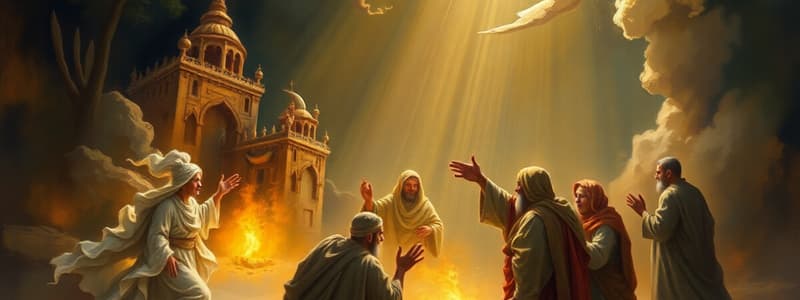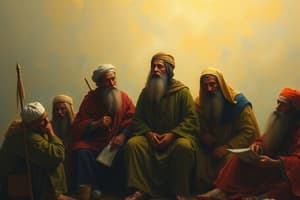Podcast
Questions and Answers
What was the purpose of the army that marched to Makkah?
What was the purpose of the army that marched to Makkah?
- To destroy the Kaaba (correct)
- To establish trade routes
- To spread a message of peace
- To protect the Kaaba
How did Allah Ta’ala intervene during the conflict?
How did Allah Ta’ala intervene during the conflict?
- By sending earthquakes
- By using floods to wash away the army
- By sending small birds (correct)
- By sending a storm
What was the fate of the army that marched to Makkah?
What was the fate of the army that marched to Makkah?
- They successfully destroyed the Kaaba
- They turned into believers
- They became allies of the Kaaba
- They were turned into dust (correct)
Which animal was prominently involved in the march toward Makkah?
Which animal was prominently involved in the march toward Makkah?
What was the ultimate outcome of the attack on the Kaaba?
What was the ultimate outcome of the attack on the Kaaba?
What can be said about the miracles attributed to a Prophet's tribe?
What can be said about the miracles attributed to a Prophet's tribe?
In which community was sorcery widely practiced?
In which community was sorcery widely practiced?
How do the miracles of a Prophet's tribe compare to common events?
How do the miracles of a Prophet's tribe compare to common events?
What does the phrase 'proportion' imply regarding a Prophet's tribe's miracles?
What does the phrase 'proportion' imply regarding a Prophet's tribe's miracles?
What is the relationship between the Pharaoh community and sorcery?
What is the relationship between the Pharaoh community and sorcery?
Flashcards
Prophet's miracles
Prophet's miracles
Miracles performed by the prophets are specific to their tribe or community.
Sorcery among Pharaohs
Sorcery among Pharaohs
Sorcery was common practice among the Pharaoh community.
Miracles' proportion
Miracles' proportion
Miracles correlate with the tribe.
Pharaoh community
Pharaoh community
Signup and view all the flashcards
Sorcery
Sorcery
Signup and view all the flashcards
Kaaba attack
Kaaba attack
Signup and view all the flashcards
Makkah
Makkah
Signup and view all the flashcards
Elephant army
Elephant army
Signup and view all the flashcards
Birds' role
Birds' role
Signup and view all the flashcards
Divine intervention
Divine intervention
Signup and view all the flashcards
Study Notes
Islamic Studies Study Notes
- Allah created humans for worship
- Islamic law (Sharia) is based on the Quran and Sunnah (Hadith)
- The Quran is the first source of Islamic law, also called Furqan, distinguishing right from wrong
- The Quran contains Allah's words
- Trust and faith in Allah are essential when reading the Quran
- Understanding the Quran is a duty of believers
- The Sunnah (Hadith) is the second source of Islamic law, focusing on the life of the Prophet (peace be upon him)
- Following the Sunnah, which includes the Prophet's actions, words, and traditions, is crucial for correctly following the Quran
- It is impossible to follow the Quran without the Sunnah of the Prophet (peace be upon him)
- Sharia is derived from both the Quran and Sunnah.
Introduction to the Holy Quran
- The Quran is the last heavenly book revealed by Allah
- Quran is derived from the word 'qira'ah' which means 'to recite' or 'to study'.
- The Quran was revealed over 23 years to the Prophet Muhammad (peace be upon him), in Arabic.
- The Quran consists of 114 surahs (chapters).
- Surahs vary in length.
- The Quran is structured in stages.
- The arrangement of Surahs in the Quran is based on divine decree and reason.
- The Quran was revealed in stages to the prophet (peace be upon him)
- Memorization of the Quran was important.
Types of Ohi
- There are two main types of Ohi: Matlu (recited) and Ghairi Matlu (un-recited).
- Ohi Matlu is the Quran, recited during prayer (Salah).
- Ohi Ghairi Matlu is the Hadith, the sayings and actions of the Prophet (peace be upon him), not recited in prayer.
Methods of Ohi Revelation
- The Quran was revealed in several ways, including divine command, dreams, or direct conversation with Allah
- The revelation of the Quran was gradual
- The order of revelation was based on Allah's will
- The revelation of the Quran was sometimes prompted by specific events or questions.
Miracle of the Quran
- The Quran is the greatest miracle of the Prophet Muhammad (peace be upon him).
- The Quran's eloquence and style are unique and incomparable.
- The Quran's scientific knowledge, revealed many centuries ago, is still relevant today.
- People who disbelieved the Quran, were challenged to match its eloquence and content.
- The Quran's ability to challenge those who disbelieved it or questioned the Prophet is another miracle.
Tazweed
- Tazweed is the correct pronunciation and recitation of the Quran
- It is crucial for proper understanding of the Quran
- Pronunciation of each letter of the Quran is essential to attain Tazweed
- The Arabic letters have different pronunciations and qualities (Sifat) according to their Makhraj (place of articulation)
- 17 Makhraj are important to pronounce letters correctly
- Proper Tazweed is essential when reciting the Quran.
Gunnah
- Gunnah is a rule of reciting the Quran, involving nasal sounds.
- There are four types of Gunnah: Qalab Gunnah, Idgam-e-ba Gunnah, Ikhfa Gunnah, and Wajib Gunnah.
- Qalab Gunnah involves changing letters from Nun Sakin or Tanvin to Mim.
- Ikhfa Gunnah involves concealing the Nun Sakin or Tanvin, with certain letters.
- Wajib Gunnah involves the utterance of letters with Tashdid (doubling).
Rules of Reciting Ra
- The letter 'Ra' can be recited in two ways: by mouth and silently
- These two manners depend on whether the 'Ra' is preceded or succeeded by 'Pesh'(Jabbeh) or 'Jer'.
Importance and Significance of Ohi (Quran and Hadiths)
- Hadith is the second source for Islamic Shari'ah.
- It is necessary to follow the Quran with proper understanding, which is possible only through the Hadiths.
- The words, actions, and tacit approval of Prophet Muhammed (SAW) are called Hadith.
- Hadith narrations are analyzed carefully by the scholars.
- The term 'Asar' is the description of what was given by the Prophet (peace be upon him)
- Fake Hadiths (called Mawzu) are prohibited.
Surah Ad-Duha
- This is the 93rd Surah of the Quran
- Reveald in Makkah during the early period of Prophethood
- It provides a lesson about the mercy of Allah to Prophet Muhammed (SAW)
- Mentions the struggles and hardship faced by the Prophet (peace be upon him) in Makkah and the rewards and blessings Allah provided for him.
Surah Al-Fil
- This is the 105th Surah of the Quran
- It highlights the miraculous intervention of Allah through the defeat of Abraha's army
- Story of the Elephant army's failure to destroy the Kaaba
- A miracle from Allah that saved the Kaaba from destruction.
Surah Al-Qadr
- This is the 97th Surah of the Quran
- Describes the significance of Laylatul Qadr (Night of Decree) in Islam
- One night of worship in Laylatul Qadr is better than a thousand ordinary months.
Ideal Lifestyle: (Surahs of the Quran and Hadiths)
- These topics discuss the preferred lifestyle in Islam, including important lessons on worship, righteousness, and character.
Dignity of Labour
- Islam emphasizes the importance of all labour, regardless of the field.
- The Prophets (peace be upon them) have demonstrated this value.
- Workers are considered as brothers in Islam
Halal Earnings
- Halal income is lawful and ethically sound
- It is vital for a well-functioning society.
- Earning through illicit or forbidden means is considered haram.
Harmony, Equality and Peace
- In Islam, harmony, equality, and peace are fundamental social ideals.
- All people are equal and should be treated with respect and dignity, regardless of their background.
- Social service towards those who are in need or in danger is important.
Compassion in Islam
- Showing compassion towards all believers, regardless of their background, is a fundamental teaching of Islam.
- The Prophet (peace be upon him) showed compassion to many people
- The Companions (peace be upon them) exemplified compassion in their lives.
Obsecnity
- Obscenity is a shameful behaviour in Islam, with extremely negative consequences
- It involves acts or words considered as immoral and forbidden
Tawakkul (Trust in Allah)
- The virtue of trusting Allah and relying on His providence
- Doing one's best while relying on Allah for the outcome is important
- A believer seeks welfare with effort and trust in Allah
Slander
- Making false accusations or spreading rumours about someone in a harmful manner is considered a sin
- Slandering is widely considered harmful and wrong in both religious and social contexts.
- The Prophet and his followers took a firm stance against slander.
Drug Addiction
- Islam views drug use as a harmful practice, forbidden because it negatively affects one's health and well-being, and potentially distorts thinking.
- Various harmful consequences can stem from addiction
- The value of health and avoiding addiction is highlighted.
Qualities of Noble Character (Akhlaq-e-Hamidah)
- Good character traits are encouraged in Islam
- Characteristics of admirable traits
- Encouraging desired qualities and discouraging negative qualities plays a vital role in the development of a strong, harmonious, and compassionate community.
Studying That Suits You
Use AI to generate personalized quizzes and flashcards to suit your learning preferences.




